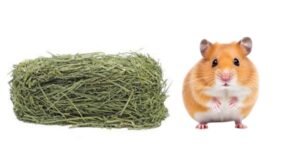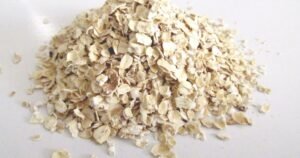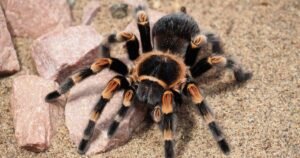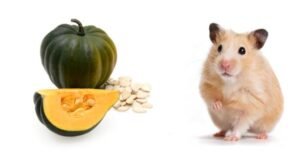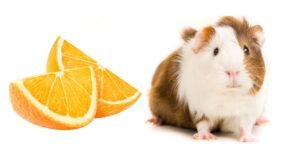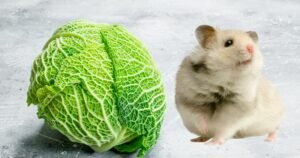Hamsters are known for their omnivorous appetites, which can leave pet owners wondering, Can Hamsters Have Turkey? The turkey provided to your hamsters must consistently be prepared, free of salt, and devoid of additional flavors.
Turkey, a lean source of protein, seems like a healthy option to incorporate into their diet. However, it’s essential to consider whether it suits these tiny creatures.
This article will delve deep into “Can Hamsters Have Turkey,” and if so, how often and how much can be offered to these adorable pets. Always remember, the wellness of our little friends comes first.
Can Hamsters Safely Consume Turkey?
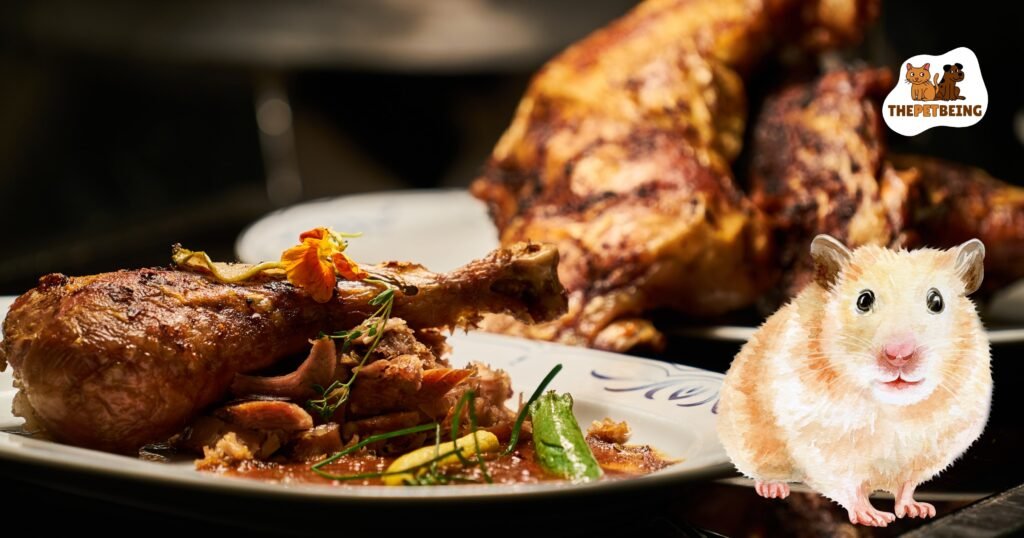
Yes, hamsters can safely consume turkey.
It is not detrimental to their health.
But, like in all things, moderation is key.
Turkey is a lean protein, which can be beneficial for hamsters.
However, it should not be the main component of their diet. “Can Hamsters Have Turkey?” you may ask.
The answer is a definite yes, but only occasionally and in small amounts.
Also, ensure the turkey is cooked, unseasoned, and cooled before offering it to your furry friend.
Their primary diet should be hamster-friendly pellets, fresh fruits, and vegetables.
Turkey can be a nice little treat once in a while.
Nutritional Benefits of Turkey for Hamsters

Turkey, albeit consumed sparingly, can offer nutritional benefits to hamsters.
Here, we outline five benefits this lean protein source can provide your furry friends.
1. High-Quality Protein
Turkey is a source of high-quality protein that aids in cell repair and growth in hamsters.
This nutrient is essential for maintaining their overall health, contributing to solid muscles, and ensuring optimal bodily functions.
Remember, turkey should be given sparingly and must be cooked and unseasoned.
2. Low Fat Content
Turkey is low in fat, making it healthier than other meats.
This feature is beneficial as high-fat foods can lead to obesity in hamsters.
Therefore, in moderation, offering turkey to your hamster can be a part of maintaining their healthy weight and overall wellness.
3. Vital Minerals
Turkey contains essential minerals like zinc and selenium.
Zinc boosts the immune system and aids in maintaining a healthy coat.
Selenium acts as an antioxidant, protecting cells from damage.
These minerals contribute to the overall well-being of your hamster, making turkey a nutritious occasional treat.
4. Source of B Vitamin
Turkey is also a notable source of B vitamins, specifically B3 and B6. Vitamin B3, known as niacin, supports digestion and promotes healthy skin.
Vitamin B6 plays a crucial role in brain development and function.
These vitamins help keep your hamster healthy, ensuring they lead a happy life.
5. Taurine
Turkey is rich in taurine, an essential amino acid for hamsters.
Taurine helps in the proper functioning of the heart and eyes.
It aids in digestion and maintains a healthy heart.
Therefore, feeding turkey to your hamster occasionally can provide them with this beneficial nutrient.
Potential Risks and Concerns When Offering Turkey To Your Hamster

While turkey provides various nutritional benefits for hamsters, it’s crucial also to consider potential risks.
Let’s discuss a few concerns to ensure your pet’s safety and well-being.
1. Choking Hazard
Turkey pieces can pose a choking hazard to tiny hamsters.
To avoid this, cut the turkey into tiny, bite-sized pieces.
Giving large chunks could lead to choking, so keeping the size suitable for your little pet’s mouth is vital.
2. Digestive Issues
While turkey is generally safe for hamsters, it can sometimes lead to digestive issues.
The high protein content may be too much for their tiny stomachs.
Too much turkey can cause digestive upset, like diarrhea.
3. High Protein Content
While turkey is a protein-rich food, too much protein can be harmful.
Hamsters need a balanced diet, and excessive protein can lead to health problems like kidney disease.
Therefore, offering turkey only occasionally and in small amounts is best, ensuring your hamster’s diet remains balanced.
4. Overfeeding
Just like humans, hamsters, too can overheat.
Offering too much turkey can lead to overfeeding.
This may cause weight gain and health problems like heart disease.
5. Consumption of Seasoned Turkey
Seasoned turkey is not safe for hamsters.
Spices and seasonings may upset their stomach or, worse, be toxic.
Always serve turkey plain, without any seasoning or sauces.
This will ensure your hamster gets the benefits of turkey without any potential health risks.
Tips To Preparing Turkey for Hamster
When offering turkey to your hamster, it’s crucial to prepare it correctly.
Follow these simple tips to ensure a safe and enjoyable turkey treat for your furry friend:
- Cook Thoroughly: Always use fully cooked turkey. Raw turkey may contain harmful bacteria that could cause illness.
- Avoid Seasonings: Never serve seasoned turkey. Spices, salt, and sauces can upset your hamster’s stomach or be toxic.
- Cut into Small Pieces: Chop the turkey into tiny, bite-sized pieces to prevent choking.
- Serve Plain: Provide the turkey plain without any accompaniments. Hamsters don’t need the extras that humans enjoy.
- Cool Down: Ensure the turkey has cooled down before serving. You don’t want to burn your hamster’s mouth accidentally.
- Portion Control: Serve only a small amount of turkey. Too much can lead to digestive issues or an unbalanced diet.
Alternative Protein Sources for Hamsters

While turkey can be a good source of protein for your hamster, there are many other safe and healthy alternatives to incorporate into their diet.
Below are 10 alternative protein sources for hamsters:
- Chicken
- Fish
- Eggs
- Tofu
- Cottage cheese
- Mealworms
- Crickets
- Peanuts
- Lentils
- Soybeans
Remember to introduce new foods gradually and in small amounts, monitoring your hamster’s reaction.
Conclusion
In conclusion, while it may seem unusual, the answer to “Can Hamsters Have Turkey?” is yes. Turkey served in moderation and prepared correctly, can be a beneficial treat for your hamster, providing essential nutrients like protein, vitamins, and minerals. However, it’s vital to remember not to overfeed your hamster and to avoid any seasonings. Always serve it in small, bite-sized pieces to prevent any choking hazards. Remember, while turkey is a good food source for hamsters, it should not replace their regular diet.
FAQs
Can hamsters have turkey?
Yes, hamsters can eat turkey. It must be cooked, unseasoned, and cut into small pieces. Turkey has protein, vitamins, and minerals suitable for hamsters. But, give turkey to them only sometimes, not every day.
Can hamsters have turkey regularly?
No, hamsters should not eat turkey regularly. While turkey is good for them because it has protein, vitamins, and minerals, it must be only a sometimes treat. Too much turkey can give them stomach upset or make them overweight.
How can I monitor my hamster’s reaction to turkey?
When you give your hamster turkey for the first time, watch them closely. See if they like eating it and how they behave after. Don’t give them turkey again if they act sleepy, sick, or strange.
Can hamsters eat turkey bones?
No, hamsters should not eat turkey bones. Bones can be too complex and might hurt your hamster’s tiny teeth. They are also a choking hazard. Always give your hamster turkey meat only, not bones. Keep your hamster safe by not giving them any bones.
What should I do if my hamster shows discomfort after eating turkey?
If your hamster shows discomfort after eating turkey, take it away. Watch your hamster; if it doesn’t improve, take them to the vet. In the future, avoid feeding them turkey.


